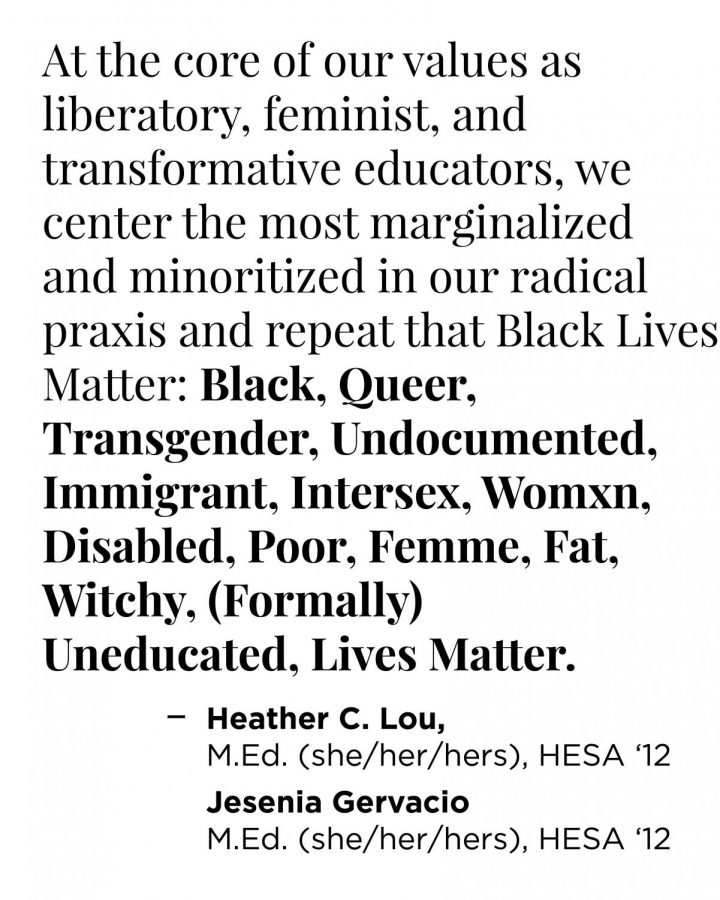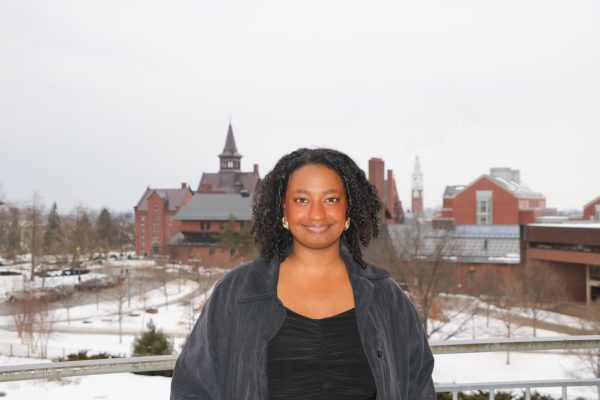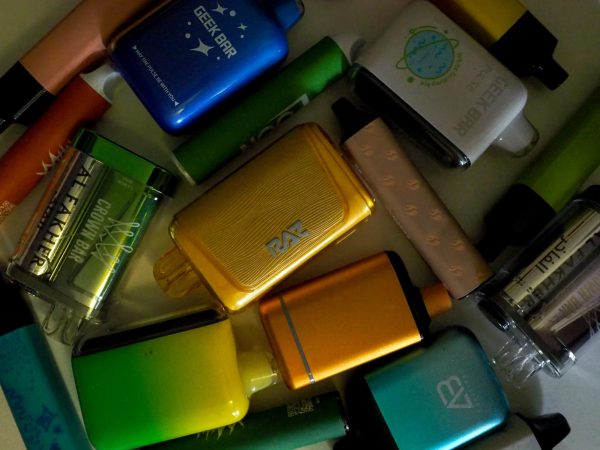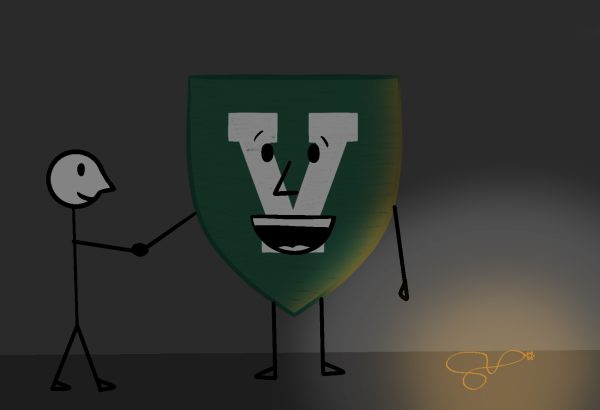Letter to the editor: Open letter from alumnx to UVM administration regarding campus climate
October 5, 2020
Dear President Garimella, Leadership Team, Board of Trustees, President’s Commission, Shared Governance Advisory Councils, and University of Vermont Community,
As two powerful womxn of color alumnx of the Higher Education and Student Affairs program and educators, we would like to begin this letter with the statement that Black Lives Matter. At the core of our values as liberatory, feminist, and transformative educators, we center the most marginalized and minoritized in our radical praxis and repeat that Black Lives Matter: Black, Queer, Transgender, Undocumented, Immigrant, Intersex, Womxn, Disabled, Poor, Femme, Fat, Witchy, (Formally) Uneducated, Lives Matter. And when we say that Black Lives Matter, we affirm that Black, Indigenous, and People of Color Lives Matter – as well as those lives of all people with hxstorically marginalized and minoritized identities. When we center the most marginalized and minoritized identities in our education and resources, then people with all identities are supported and served- including those with privilege. Black Lives Matter.
The United States is a settler-colonial structure that centers and upholds and privileges white supremacy, heteropatriarchy, capitalism, and ableism – and the University of Vermont is a microcosm of this structure. Since the university’s founding on stolen Abenaki land, its legacy of erasure of Black, Indigenous, and People of color hxstories has been deeply embedded in its hxstory. From focusing on white men’s education to practicing eugenics in the 1900s, to Kake Walk minstrel shows as late as the 1970s, and now – the censoring of Black Lives Matter and Hxspanic Heritage Month flags on campus, demonstrate overt actions of white supremacy and collusion in the university’s structure and institution, negatively impacting students, staff, faculty, and community members. These overt assaults are glaring and beyond disappointing, especially given the current events of 2020, and are only the ones that have been reported as of late by students, staff, faculty, and community members willing to take that risk. We recognize that there are numerous assaults that occur daily that impact the wellbeing of all people with hxstorically minoritized identities and experiences, as the impact of racialized violence is a public health issue that also negatively impacts white people as well.
The University of Vermont has continued to be an extremely predominantly white institution well before we attended from 2010-2012, and has touted itself to be focused on social justice, community, and inclusion. As educators, we recognize the complexity of these foci and values, especially as they are often neoliberal in practice within institutions. Our graduate program, faculty mentorship, a professional practice taught us to recognize, address, interrupt, and dismantle systems of oppression through direct advocacy, critically-engaged scholarship, and coalition building. During our two years in Burlington Vermont, we navigated some of the most difficult moments of overt and covert racism from peers, supervisors, students, faculty, and community members – but also recognize that we have survived these moments before and after our time in Vermont. We are not the first or last to navigate white supremacy – as we are legacies of resistance from the blood, bones, and energy of our ancestors.
It is beyond time for the University of Vermont to actually put into practice the social justice values you purport to be central to your institutional identity. Instead of espousing social justice ideals in a performative matter and enforcing policies that enforce white supremacy and administrative violence within a continued carceral state that disproportionately impacts BIPOC students, staff, and faculty, demonstrate to the current campus community and your alumni through direct action and accountability that you are willing to center and support the most negatively impacted by hxstorical legacies of white supremacy and settler colonialism (including current policies, procedures, and practices) at the university amongst us and honor their lived experiences.
At this point in our statement, we would like to propose several action items – firstly, as well respected scholars and colleagues within the field of postsecondary education – and secondly, as alumnx. We believe that these action items would not only address the needs of students, staff, faculty, community members, alumnx, and constituents, but also would help the university move closer to engaging in a more inclusive campus, especially in the current national climate. We understand that given the founding of most universities within the United States, the epidemic of white supremacy, white nationalism, and settler colonialism cannot be remedied and eradicated unless these systems are completely dismantled – so there is no illusion that the University of Vermont or any institution can be transformed for liberation. However, we believe that the following should occur and urge:
- This is the time for leaders with more dominant identities to let those of us with innovative leadership styles lead with our community-centered care and power. As upper-level administrators, you must stop, listen, and follow the lead of BIPOC students, staff, faculty, alumni and community members telling you how policies, procedures, and practices are continuing to minoritize and marginalize their identities and experiences on campus. For example, the raising of identity-based flags may feel like symbolic moments of visibility – and the taking down of flags after five days may feel like a steadfast whiplash of erasure, tokenization, and minimization of the impact of racism and violence. The flag policy, which states that flags can be flown for 5 days at a time for “approved special events” does not provide examples for exceptions in times of pain and grief (such as the murder or George Floyd or Breonna Taylor) or joy (such as Hxspanic Heritage Month). There is also no mention of censorship of flying flags on university residences. We believe that flags are free speech, and should be flown for permanent duration publicly throughout the university and at university residences, so long as they do not interfere with student educational pursuits. Between COVID-19 and xenophobia, anti-Black racism, immigration detention camps and forced sterilizations, and the upcoming election, this is a tumultuous time for many of us. We also have lived through many difficult experiences and hxstories – we have creative solutions that are bound to lead the way to more inclusive environments for learning, leading, and growing.
- Review of interactions with UVM and Burlington Police departments and divest from these structures within 3 years. It is evident that policing disproportionately enacts violence on BIPOC communities and people with hxstorically marginalized and minoritized communities. UVM has engaged in restorative practice models and has the ability to learn from other innovative institutions and communities to develop safer accountability practices that do not utilize policing.
- Acknowledgment and removal of colonial figures, art, violent artifacts, and building names that reinforce white supremacy and erasure of Black, Indigenous, and People of Color on campus, including any aggrandizing of Ira Allen, eugenics, Kake Walks, etc. Instead, the campus should be centering the narratives and hxstorical experiences, art, and tradition of the Abenaki people and acknowledge the colonization of the land that UVM is on. We understand that the university may choose not to remove the figures, art, artifacts, and building names – and strongly believe that UVM should add counter-narratives to art labels discussing the problematic nature of each piece, as well as adding discussion points to campus tours, including educational information about counter-spaces as to how certain centers and spaces came to be located in their current locations (i.e. MOSAIC Center for Students). These hxstories and legacies matter, especially at extreme predominantly white institutions, and can be helpful additions to orientations, employee onboarding, information sessions, etc.
- A holistic and deep-seated review of the university structure, and recentering the Diversity, Equity, and Inclusion functional areas through budget, physical space, staffing and other needed resources. This includes moving departments within this portfolio to central and visible spaces on campus, ensuring that salaries within these departments are equitable to others across the university, programs and services are appropriately funded, and that the university understands that diversity, equity, and inclusion initiative and practices should be embedded within the work of all employees – from recruitment, interviewing, onboarding, offboarding, etc. of student, staff, faculty, etc. We also urge the university to review and provide appropriate equity raises for staff, faculty, and graduate students who are BIPOC and/or who identify with intersecting hxstorically minoritized and marginalized identities.
- Engagement with BIPOC alumnx from across disciplines to help provide guidance to the President and Leadership Team to help advise the university during this time of transition, challenge and quest for practical application of social justice and inclusion. This alumnx advisory committee will provide feedback to the university regarding current events, policies, procedures, and processes, as well as an external review and recommendations for improving practices to improve the climate. Each alumnx serving should be compensated for this service and provided the appropriate training and tools necessary to execute this work to its best capacity in order to provide a better learning experience for students at the university.
- University students, staff, and faculty engage in social justice work beyond the community values and training. We believe training is only one part of the puzzle to social justice as educators. We might be able to use fancy words, but that does not mean that we are trauma-informed pedagogues and practitioners. Reflection without action is verbalism. We assert that the university has been engaging in neoliberal verbalism and critically engaged praxis is long overdue. We believe that the university must have a curriculum that holds staff and faculty accountable to training and application of these principles in and outside of the classroom to enhance the experiences of students during a time of an accumulation of trauma. These practices should be assessed and reviewed for accountability at 3, 6, 9, and 12 months in the process for all levels of the institution, including for supervisors and upper level administration. A 360 degree review is necessary and student feedback should be at the center of the review, as they are the ones who are directly impacted by the values and application of training.
- In a time of alternative facts, it is also important to allow students to report their experiences and the news without the impact of the chilling or freezing effect of the university administration. Student newspapers and media (broadcast, radio, etc.) should be allowed the privileges of the first amendment – the freedom of the press – and it is their duty to report on the issues and concerns of the student body without the censorship or intimidation of staff or administrators. The press, even student press, play a vital role in reporting the experiences of students on campus, especially as they navigate their identities, power, and privilege. With this, we urge the university to move the student newspaper and all media back to the Department of Student Life for advising and ensure that the students have the training and support of a student affairs professional that understands the role of an adviser of the press, not public image or relations.
These proposed actions are some of many that have the potential to more positively impact the University of Vermont community. In fact, there are likely more brilliant, creative, and innovative ideas that students, staff, faculty, alumnx, and community members can provide feedback to the university. President Garimella, Leadership Team, Board of Trustees, President’s Commission, and Shared Governance Advisory Councils- we are writing this letter because we are disappointed in our alma mater and institution that we have earned our esteem degrees from. We are ashamed that Black, Indigenous, and People of color students feel unsafe, unwelcome, and invisibilized on the campus where we have called home. We are angry that students are expected to learn and grow in spaces that continue to deny their existence and humanity, and now expect you as administrators with great responsibility to these students (as well as the rest of the university community) to support them through direct action, as you are accountable to their educational experiences.
To the Black, Indigenous, and People of Color students the University of Vermont: We are with you. We see you. You are not alone. You matter. You are powerful. You are so smart and talented. You belong here. You are brave. Your ancestors are proud and are supporting you. We are also proud and support you. We care. We are in solidarity. Black Lives Matter.
In solidarity,
Heather C. Lou, M.Ed. (she/her/hers), HESA ‘12
Jesenia Gervacio, M.Ed. (she/her/hers), HESA ‘12
To co-sign this letter, members of the University of Vermont HESA alumnx and other concerned community members can complete this form here: https://forms.gle/41H4zSKmMvVamL1Y8
Link to the letter for review here: https://bit.ly/33uNmBb
As University of Vermont HESA alumnx and community members, we are co-signing this letter and urging President Garimella, Leadership Team, Board of Trustees, President’s Commission, Shared Governance Advisory Councils to act upon these recommendations above:
- Kristine A. Din, she/her/hers, HESA ‘12
- Ray Mattila, he/him/his, HESA ‘12
- Jeff Godowski, they/them, HESA, ’15
- Jeffrey Tsang, he/him/his, HESA, ‘16
- Audrey Redmond, she/her/hers, HESA, ‘14
- Em Huang, they/them, HESA, ‘17
- C. V. Dolan, they/them/theirs, HESA ’13
- Laura E. Megivern, she/her/hers, ‘05 G’10
- Ben Huelskamp, he/him/his, HESA’13
- mae stephenson, she/her/they/them, HESA ’12
- Matt Van Jura, he/him/his, HESA ‘10
- Molly Williams, she/her/hers, HESA ’20
- Emelia M Orellana, she/they/them, HESA ’22
- Viraj Patel, she/hers, HESA ’11
- Daphne R. Wells (She/Her), HESA 06, Director, Student Life and The Davis Center
- Jo Wilson, they/them, HESA ‘21
- Raja Gopal Bhattar, they/them, HESA ‘07
- Salomon Rodezno, he/him/his, HESA, ’11
- Sarah M. Childs, she/her/ella, HESA, ‘08
- Erin-Kate Escobar, they/them, HESA, ’14
- Cornell Verdeja-Woodson, he/him/his/himself, HESA ‘13
- Marco Blanco, he/him, ‘14
- Sara Blair-Medeiros, she/they, HESA, ‘13
- Maggie Hussar, she/her, HESA ’18
- Lori Yi, she/her/hers, HESA ’10
- Meg LaLonde (she/her), HESA, G’19
- Daniel Watts, UVM HESA M.Ed. ‘91
- Roman Christiaens, they/them/theirs, HESA ’15
- Danielle N. Aguilar, she/her/hers, HESA ‘14
- Drake Douglas, he/him/his, HESA ’14
- Eric G. Carnaje( he/him/his), HESA ‘16, Director of Orientation at UVM
- Graham Davis, he/him/his, HESA ’16
- Llu Mulvaney-Stanak (they/them), UVM M.E.d, ’11, Former Student Life Assistant Director of Leadership & Civic Engagement
- Andrew W. Mayer, he/him/his, HESA ‘16
- Michael Paul A. Wong, he/him/his, HESA, ‘92
- Lizzy Gomez (she/her/hers), HESA ‘15
- Janine Silvis, they/them/theirs, HESA 18
- Vic Sanchez, they/he, HESA, ’14
- Amanda Flores, she/her/hers, HESA ‘11
- Lu Butterfield-Ferrell, they/them HESA ‘11
- Harvey Vincent, he/him/his, HESA ’19
- Dustin Evatt-Young, he/him/his, HESA, ‘11
- Benedicto Borja Llave (name/he/they), HESA ’20
- Valerie Garcia-Rea, she/her/hers, HESA, ’10
- Isora Lithgow (she/her/hers) UVM B.S.’16 & HESA’20
- Keyiona Ritchey, she/her, HESA, ’14
- Julia Pingeton, she/her/hers, HESA 2020 community members
- Christine Nguyen, she/her/hers, HESA ’11
- JAKE Small, he/him, HESA ’21
- Kailee Brickner-McDonald (she/her/hers), HESA ‘10, Ed.D ‘16
- Kathleen Manning (she, her, hers); HESA faculty 1989-2014
- Kirsten Fricke, she/her/hers, HESA, ‘10
- Chantel Vereen ’21
- Tatiana Havens (she/her), HESA ‘22
- Rosemary J. Perez, she/her/hers, HESA ’01
- Nathan Victoria, he/him/his, HESA ’07
- Kimberly Ead, she/her/hers, former employee
- Todd Cooley, he/him/his, HESA, ’22
- Melissa Thomas Hagan, she/her/hers, HESA ‘01
- finn schneider, they/them/theirs, HESA ’10
- Katelyn Sadler, she/her/hers, HESA ‘11
- Jennifer Wegner, she/her/hers, HESA ’03
- Elizabeth Guevara-Laxamana, she/her/hers, HESA, ‘08
- Amanda Wong, she/her/她, ’10, former Office of Student and Community Relations Office Manager











